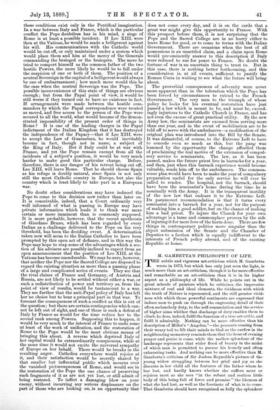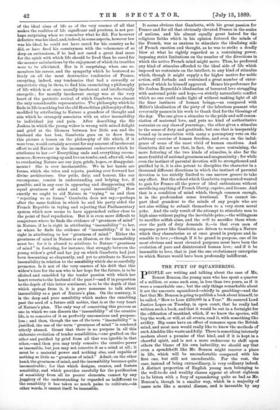M. GAMBETTA'S PHILOSOPHY OF LIFE.
THE subtle and vigorous art-criticism which M. Gambetta wrote in 1873, but which has only just seen the light, is much more than an art-criticism, though it is far more effective
and remarkable as an art-criticism than it is in its higher aspect as a philosophy of life. While he points out in the great schools of painters which he criticises, the impressive mixture of real and ideal elements, the vividness with which the truth of Nature is represented, and the still greater vivid- ness with which those powerful sentiments are expressed that induce men to push on through the engrossing detail of their often melancholy duty, to the self-renunciation and the service of higher aims whither that discharge of duty enables them to climb, he does, indeed, fulfil the function of a true art-critic, and fulfil it admirably. Nothing can be more effective than his description of Millet's "Angelus,"—the peasants ceasing from their weary toil to lift their minds to God as the curfew in the neighbouring monastery reminds them that the hour of evening prayer and praise is come, while the mellow splendour of the landscape represents that wider flood of beauty in the midst of which man is permitted to pursue his homely and often exhausting tasks. And nothing can be more effective than M. Gambetta's criticism of Sir Joshua Reynolds's picture of the young widow struggling between her grief and joy as she discerns in her child all the features of the father whom he has lost, and hardly knows whether she suffers most or rejoices most as she sees "in the robust and restless little body of this being full of force and promise" the likeness of what she had lost, as well as the foretaste of what is to come. That Gambetta should have recognised so fully the splendour
of the ideal aims of life as of the very essence of all that makes the realities of life significant and precious, is not per- haps surprising when we remember what he did. For however defective was his ideal, and, indeed, in some aspects, however low was his ideal, he could not have cared for his country as he did, or have fired his countrymen with the vehemence of so deep an enthusiasm, if he had not cared a great deal more for the spirit with which life should be lived than he cared for the meaner satisfactions by the enjoyment of which its troubles were to be alleviated. Nor is it surprising, when one re- members his career, and the sympathy which he bestowed so freely on all the most destructive tendencies of France, excepting, indeed, any tendencies that had a cowardly or unpatriotic ring in them, to find him enunciating a philosophy of life which is at once morally incoherent and intellectually energetic ; for morally incoherent energy was at the very heart of the patriotic revival of which Gambetta was almost the only considerable representative. The philosophy which he finds in life is nothing but the old Heraclitian philosophy of flux, modified by attributing to Nature a grandeur of thought and aim which he strangely associates with an utter insensibility to individual joy and pain. After describing the Sir Joshua in which the young widow is wrung with mixed delight and grief at the likeness between her little son and the husband she has lost., Gambetta goes on to draw from this picture a lesson on the philosophy of life which, if it were true, would certainly account for any amount of incoherent effort to aid Nature in the inconsistent endeavours which he attributes to her :—" Everything ends and everything recom- mences; flowers spring up and live on tombs; and, after all, what to everlasting Nature are our joys, griefs, hopes, or disappoint- ments ? She is ever inexhaustible. We in her hands are forms, which she tries and rejects, pushing ever forward her divine architecture. Our pride, duty, and honour, like our recompense, consist in understanding and helping her, if possible, and in any case in appearing and disappearing with equal greatness of mind and equal insensibility." How exactly we ought to aid Nature in " trying " us and then "rejecting us as forms," Gambetta does not say,—perhaps after the same fashion in which he and his party aided the French Republic in trying and rejecting that Parliamentary system which now seems to have approached rather close to the point of final repudiation. But it is even more difficult to conjecture where he finds the evidence of "greatness of mind" in Nature, if he is right in attributing " insensibility " to her, or where he finds the evidence of "insensibility," if he is right in attributing to her "greatness of mind." Either the greatness of mind in Nature is an illusion, or the insensibility must be; for it is absurd to attribute to Nature "greatness of mind" in fostering, for instance, that struggle between the young widow's grief and her joy on which Gambetta had just been descanting so eloquently, and yet to attribute to Nature insensibility in relation to the sensibility which she so carefully promotes. Is it not of the very essence of his drift that this widow's love for the son who is her hope for the future, is to be elicited and ennobled by the tender passion with which her heart reverts to the husband of the past ?—and if in proportion to the depth of this latter sentiment, is to be the depth of that which springs from it, it is pure nonsense to talk about insensibility as a part of Nature's plan. On the contrary, it is the deep and pure sensibility which makes the ennobling past the seed of a future still nobler, that is at the very heart of Nature's plan. The only way of conceiving this process as one in which we can discern the " insensibility " of the creative life, is to conceive of it as perfectly unconscious and purpose- less ; and then, though the use of the term " insensibility " is justified, the use of the term "greatness of mind" is rendered utterly absurd. Grant that there is no purpose in all this elaborate evolution of tender sensibilities,—one grafted on the other and purified by grief from all that was ignoble in that other,—and then you may truly conceive the creative power as insensible, but you may not conceive it as a mind at all; it must be a material power and nothing else, and capable of nothing so little as "greatness of mind." Admit, on the other hand, the greatness of mind, and the insensibility becomes quite inconceivable ; for that which designs, creates, and fosters sensibility, and which provides carefully for the purification of sensibility from all its poorer elements, cannot by any jugglery of the understanding be regarded as indifferent to the sensibility it has taken so much pains to cultivate,—in other words, it cannot itself be insensible. It seems obvious that Gambetta, with his great passion for France and for all that obviously elevated France in the scales of nations, and his almost equally great hatred for the religious faiths which in his opinion fettered the minds of the French, was as anxious to stimulate the idealising side of French emotion and thought, as he was to strike a deadly blow at what he rightly regarded as a restraining power, imposing strict limitations on the number of the directions in which the active French mind might move. Thus, he preferred any kind of stimulus afforded to the ideal side of life which imposed no restraints on the intellect, to any kind of stimulus which, though it might supply a far higher motive for noble action, still forbade and restrained a great number of enter- prises of which he himself approved. Hence his preference for Sir Joshua Reynolds's idealisation of bereaved love struggling with maternal pride and hope,—a strictly naturalistic conflict which no one could make light of without making light of all the finer instincts of human beings,—as compared with Millet's idealisation of the piety of the laborious peasant who reverently pauses in his work to thank God for the blessings of the day. The one gives a stimulus to the pride and self-renun- ciation of maternal love, and puts no kind of authoritative restraint on any class of yearnings ; the other gives a stimulus to the sense of duty and gratitude, but one that is inseparably bound up in association with many a peremptory veto on the arbitrary exercise of human freedom, and even on the indul- gence of some of the most vivid of human emotions. And Gambetta did not see that, in fact, the more restraining, the more fettering of the two kinds of stimulus, is also far the more fruitful of national greatness and magnanimity ; for while even the instinct of parental devotion will be strengthened and purified by it, it is also potent to discipline the character in a thousand different directions in which the instinct of parental devotion is too strictly limited to one narrow groove to take any effect. But the school which Gambetta represented wanted to gain for France all the power of ideal• enthusiasm without sacrificing anything of French liberty, caprice, and license. And that is a condition of mind which, though common enough, is in the profoundest sense irrational. You cannot im- part ideal grandeur to the minds of any people who are not also willing to submit themselves to a very stern moral yoke. And the only result of the attempt to stimulate men to high aims without paying the inevitable price,—the willingness to sacrifice selfish aims, and the will to sacrifice them when- ever the path of duty demands it,—is that even men of supreme power like Gambetta are driven to worship a Nature which they characterise as at once grand in purpose and in- sensible to love ;—though if it be grand in purpose, one of its most obvious and most elevated purposes must have been the evolution of pure and disinterested human love ; and if it be insensible to love, that is just the one evolutionary enterprise to which Nature would have been profoundly indifferent.



































 Previous page
Previous page